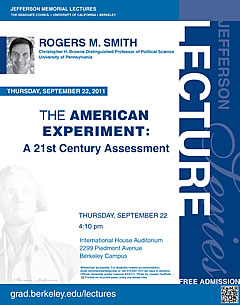
Rogers M. Smith
Christopher H. Browne Distinguished Professor of Political Science, University of Pennsylvania
Jefferson Memorial Lectures
September 22, 2011 — 4:10 PMInternational House Auditorium — 2299 Piedmont Avenue, Berkeley
About The Lecture
Rogers Smith’s lecture will focus on what many founders called the “American Experiment” in government embodied in the U.S. Constitution: a democratic republic, without a national church, devoted to fostering commerce, scientific progress, and to realizing the national motto, “E Pluribus Unum.” Two and a third centuries later, whether America’s constitutional democracy can form a more perfect union out of its ever-growing economic, religious, and racial and ethnic diversity is again the central test of the “American experiment.”
About Rogers M. Smith
Rogers Smith’s work has focused on citizenship, constitutional law, and American political thought. Smith is the Christopher H. Browne Distinguished Professor of Political Science at the University of Pennsylvania and also serves as chair of the Penn Program on Democracy, Citizenship, and Constitutionalism. He teaches on topics of American constitutional law and civil rights and civil liberties, with special interests in issues of citizenship and racial, gender, and class inequalities. His lecture will focus on what many founders called the “American Experiment” in government embodied in the U.S. Constitution: a democratic republic, without a national church, devoted to fostering commerce, scientific progress, and to realizing the national motto, “E Pluribus Unum.” Two and a third centuries later, whether America’s constitutional democracy can form a more perfect union out of its ever-growing economic, religious, and racial and ethnic diversity is again the central test of the “American experiment.”
A prolific writer, Smith has authored or co-authored many essays and books, including Still a House Divided: Race and Politics in Obama’s America (with Desmond S. King, 2011); Stories of Peoplehood: The Politics and Morals of Political Membership (2003); The Unsteady March: The Rise and Decline of Racial Equality in America (with Philip A. Klinkner, 1999); Civic Ideals: Conflicting Visions of Citizenship in U.S. History (1997); Citizenship without Consent: The Illegal Alien in the American Polity (with Peter H. Schuck, 1985); and Liberalism and American Constitutional Law (1985). These works have received seven “best book” awards from the American Political Science Association, the Organization of American Historians, the Social Science History Association, the Association of American Publishers, and the W. E. B. Du Bois Institute. Civic Ideals was also a Finalist for the 1998 Pulitzer Prize in History.